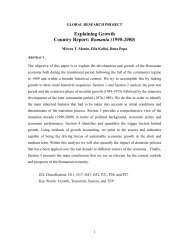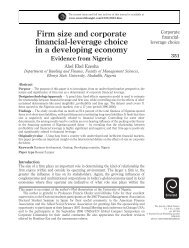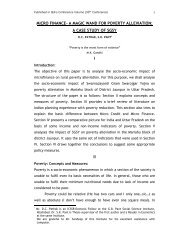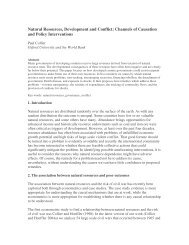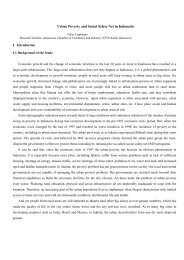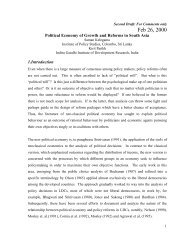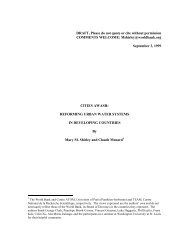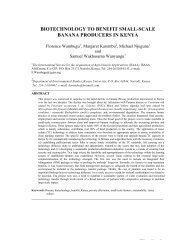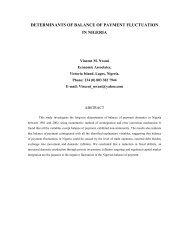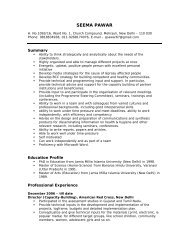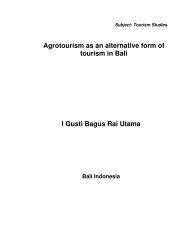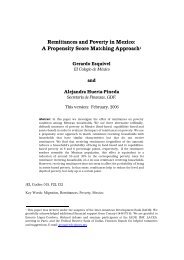The Case of Shehla Zia Versus WAPDA in Pakistan
The Case of Shehla Zia Versus WAPDA in Pakistan
The Case of Shehla Zia Versus WAPDA in Pakistan
You also want an ePaper? Increase the reach of your titles
YUMPU automatically turns print PDFs into web optimized ePapers that Google loves.
Residents <strong>of</strong> Block F-6/1 <strong>in</strong> Islamabad protested to <strong>WAPDA</strong> aga<strong>in</strong>st the planned construction <strong>of</strong> a<br />
power/grid station <strong>in</strong> the Block. <strong>The</strong>y po<strong>in</strong>ted out that the electromagnetic field caused by the<br />
presence <strong>of</strong> the high voltage transmission l<strong>in</strong>es at the grid station would pose a serious health<br />
hazard to the residents <strong>of</strong> the area, particularly the children, the <strong>in</strong>firm and the Dhobi-ghat<br />
families liv<strong>in</strong>g <strong>in</strong> the immediate vic<strong>in</strong>ity. <strong>The</strong> presence <strong>of</strong> electrical <strong>in</strong>stallations and transmission<br />
l<strong>in</strong>es would also be highly dangerous to the citizens, particularly the children who play outside <strong>in</strong><br />
the area and that it would damage the greenbelt and affect the environment. It was also alleged<br />
violate the pr<strong>in</strong>ciples <strong>of</strong> plann<strong>in</strong>g <strong>in</strong> Islamabad where the green belts are considered an essential<br />
component <strong>of</strong> the city for environmental and aesthetic reasons. <strong>The</strong> f<strong>in</strong>al hear<strong>in</strong>g <strong>of</strong> the <strong>Case</strong> was<br />
held at the Supreme Court <strong>of</strong> <strong>Pakistan</strong> on 12th February 1994. Both sides produced research<br />
material, <strong>in</strong>clud<strong>in</strong>g journal articles, expert op<strong>in</strong>ions and comments from relevant organizations to<br />
support their claims to the Court. <strong>The</strong>se <strong>in</strong>cluded published scientific material from developed<br />
countries (mostly US, Canada and Sweden), relevant research material and expert op<strong>in</strong>ions from<br />
the M<strong>in</strong>istry <strong>of</strong> Water and Power, Susta<strong>in</strong>able Development Policy Institute, Council <strong>of</strong> Scientific<br />
and Industrial Research, Lahore. <strong>The</strong> Court analyzed the material presented and its observations<br />
were as follows:<br />
'From the material produced on record, which conta<strong>in</strong>s updated studies and research, it seems that<br />
so far no def<strong>in</strong>ite conclusion has been drawn by the scientists and scholars, but the trend is <strong>in</strong><br />
support <strong>of</strong> the fact that there may be the likelihood <strong>of</strong> adverse effects <strong>of</strong> electromagnetic fields on<br />
human health. It is for this reason that <strong>in</strong> all the developed countries special care is be<strong>in</strong>g taken to<br />
establish organizations for carry<strong>in</strong>g on further research on the subject. <strong>The</strong> studies are, therefore,<br />
not certa<strong>in</strong>, but <strong>in</strong>ternationally there seems to be a consensus that the lurk<strong>in</strong>g danger which, <strong>in</strong> an<br />
<strong>in</strong>def<strong>in</strong>ite manner, has been found <strong>in</strong> <strong>in</strong>dividual <strong>in</strong>cident and studies, cannot be ignored'.<br />
<strong>WAPDA</strong> however <strong>in</strong>sisted on execut<strong>in</strong>g the plan, which accord<strong>in</strong>g to them is completely safe and<br />
risk free. <strong>The</strong> material submitted by <strong>WAPDA</strong> was based on studies carried out two decades ago.<br />
<strong>The</strong>ir other statement was based on personal observation <strong>of</strong> their workers work<strong>in</strong>g <strong>in</strong> grid stations<br />
and further afield where no such compla<strong>in</strong>t has been made. <strong>The</strong> research and op<strong>in</strong>ions relied upon<br />
by <strong>WAPDA</strong> are not the best nor from authentic sources as they were merely rely<strong>in</strong>g upon old<br />
op<strong>in</strong>ions. In the present-day controversies, where every day new avenues are opened up, new<br />
research is conducted and progress is be<strong>in</strong>g reported <strong>in</strong> the electrical fields, it would be advisable<br />
for <strong>WAPDA</strong> to employ better resources and personnel engaged <strong>in</strong> research and study to keep<br />
themselves up-to-date <strong>in</strong> scientific and technical knowledge, and adopt all measures necessary for<br />
safety aga<strong>in</strong>st the adverse effects <strong>of</strong> magnetic and electric fields.<br />
On the other hand, the materials placed by the petitioners were the latest research carried out<br />
exam<strong>in</strong><strong>in</strong>g the effects on health <strong>of</strong> magnetic fields and also on the possible dangers that may be<br />
caused to human be<strong>in</strong>gs. In the absence <strong>of</strong> any def<strong>in</strong>ite conclusion that electromagnetic fields do<br />
not cause childhood leukaemia and adult cancer, and <strong>in</strong> the presence <strong>of</strong> <strong>in</strong>conclusive studies, the<br />
subject requires further research. Thus the conclusions drawn earlier <strong>in</strong> favor <strong>of</strong> the power<br />
company are doubtful. <strong>The</strong> safest course seems to be to adopt a method by which danger, if any,<br />
may be avoided.<br />
<strong>The</strong> Court <strong>in</strong>dicated that ‘at this stage it is not possible to give a def<strong>in</strong>ite f<strong>in</strong>d<strong>in</strong>g on the claims <strong>of</strong><br />
either side. <strong>The</strong>re is a state <strong>of</strong> uncerta<strong>in</strong>ty and <strong>in</strong> such a situation the authorities should observe<br />
the rules <strong>of</strong> prudence and precaution. <strong>The</strong> rule <strong>of</strong> prudence is to adopt such measures which may<br />
avert the so-called danger, if it occurs. <strong>The</strong> rule <strong>of</strong> precautionary policy is to first consider the<br />
welfare and safety <strong>of</strong> the human be<strong>in</strong>gs and the environment and then to pick up a policy and<br />
execute the plan that is more suited to obviate the possible dangers to make such alternate



